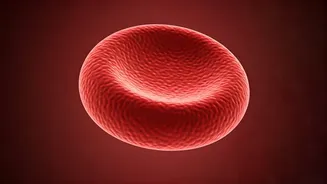What Is B12?
Vitamin B12, also known as cobalamin, is a vital nutrient that your body needs but cannot produce on its own. This essential vitamin is crucial for several
bodily functions. It plays a significant role in nerve function and the formation of red blood cells. Moreover, it is important for DNA synthesis and cell metabolism. Because the body doesn't create B12, it must be obtained through the diet or supplements. The recommended daily intake varies depending on age, health, and other factors. It's often found in animal products like meat, fish, eggs, and dairy, making vegetarians and vegans potentially at higher risk for deficiency. B12 absorption requires a complex process, involving stomach acid and a protein called intrinsic factor. Any disruption in this process can hinder B12 absorption and lead to deficiencies, emphasizing the importance of understanding the body's mechanisms for maintaining optimal B12 levels.
Causes of Deficiency
Several factors contribute to Vitamin B12 deficiency. One of the main causes is a lack of sufficient B12 intake through diet, especially common in vegetarians and vegans who avoid animal products, which are the main dietary sources. Another key cause is impaired absorption. This can stem from conditions like pernicious anemia, an autoimmune disease where the body attacks the cells that make intrinsic factor, preventing B12 absorption. Problems with the digestive system, such as Crohn's disease or celiac disease, can also hinder B12 absorption. Certain medications, like proton pump inhibitors and metformin, can also affect B12 levels. Age is another factor, as older adults often have reduced stomach acid and are at a higher risk of deficiency. Furthermore, certain genetic factors and surgeries affecting the stomach or intestines can impact the ability to absorb B12. Understanding these varied causes underscores the importance of a balanced diet, proper digestive function, and awareness of any underlying health issues that may contribute to B12 deficiency.
Who Is at Risk?
Certain groups of people are at a higher risk of developing Vitamin B12 deficiency. Vegetarians and vegans, who exclude animal products from their diet, are at the top of the list unless they regularly take B12 supplements or consume fortified foods. Older adults are also particularly vulnerable, as their ability to absorb B12 can decrease with age, due to reduced stomach acid and other age-related factors. People with gastrointestinal disorders, such as Crohn's disease, celiac disease, or those who have undergone weight-loss surgeries, face an increased risk due to impaired absorption. Individuals with pernicious anemia, an autoimmune condition affecting B12 absorption, are also at high risk. Additionally, those taking medications that interfere with B12 absorption, like proton pump inhibitors or metformin, should monitor their B12 levels. Recognizing these at-risk groups is important for targeted prevention and early detection of B12 deficiencies.
Early Warning Signs
The early signs of Vitamin B12 deficiency can be subtle, but it's essential to recognize them. Fatigue and weakness are among the most common early indicators. Numbness or tingling in the hands and feet can also signal a deficiency. Other early signs include neurological symptoms like difficulty with balance or coordination, and cognitive issues such as memory problems or confusion. Gastrointestinal symptoms, such as loss of appetite, weight loss, or diarrhea, may also appear. Some individuals may experience a sore or red tongue. Some people may also notice a change in mood, possibly depression or irritability. Early recognition of these signs is vital for prompt diagnosis and treatment. Seeking medical attention and getting blood tests to confirm the deficiency can help prevent further health complications.
How to Diagnose?
Diagnosing a Vitamin B12 deficiency involves a combination of methods. The initial step usually involves reviewing the patient's medical history and performing a physical examination to assess symptoms. Doctors typically order a blood test to measure B12 levels in the serum. Low levels indicate a potential deficiency. Further tests may be needed to determine the underlying cause. A complete blood count can assess the size and number of red blood cells, as B12 deficiency often causes abnormally large red blood cells (macrocytosis). To investigate absorption problems, a Schilling test may be used. This test involves measuring the body's ability to absorb B12. Measuring levels of methylmalonic acid (MMA) and homocysteine in the blood can also help, as these substances accumulate when B12 levels are low. Early detection and accurate diagnosis are critical for effective treatment and preventing long-term health issues.
Treatment Options
The treatment for Vitamin B12 deficiency varies based on the severity of the deficiency and the underlying cause. For mild deficiencies, dietary changes may be sufficient. Incorporating B12-rich foods such as meat, fish, eggs, and dairy products can help. If dietary changes aren't enough, oral B12 supplements are often recommended. These supplements are available in various forms, including tablets and sublingual lozenges. For more severe deficiencies or if absorption is compromised, B12 injections are often preferred. These injections bypass the digestive system and ensure direct absorption of the vitamin. Injections are typically administered intramuscularly on a regular basis. Treatment duration and dosage depend on the individual's response and the underlying cause. In cases of pernicious anemia, lifelong B12 injections are usually necessary. Regular monitoring of B12 levels and addressing any underlying medical conditions is crucial for successful management of the deficiency.





















